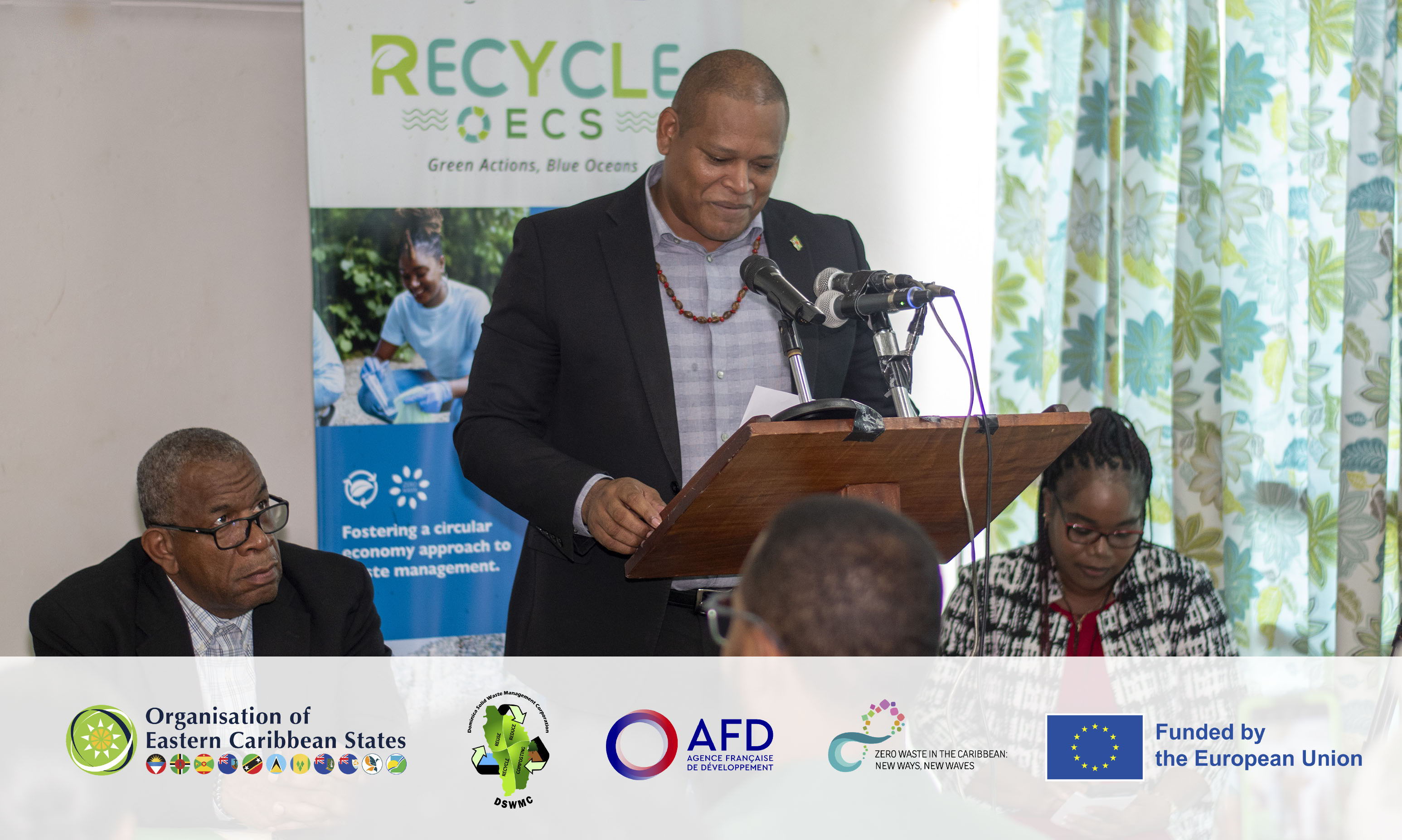RECYCLE OECS Model Demonstration Launched in Dominica
OECS Media Release
July 20, 2023 — On Wednesday July 19, the Dominica Solid Waste Management Corporation (DSWMC) launched their Recycle OECS Model Demonstration with a strong showing of high-level government support. Present for the livestreamed event were representatives from the ministries of Tourism, Agriculture, Fisheries, Blue and Green Economy, Finance, Economic Development, Climate Resilience and Security; and Foreign Affairs International Business, Trade and Energy.
The event was also attended by representatives of the implementing partners - The OECS Commission and Agence Française de Développement (AFD), and by a representative from the Grenada Solid Waste Management Authority (GSWMA), the DSWMC’s counterpart, which is implementing a second Recycle OECS Model Demonstration. Local private sector personnel were in attendance too.
Delivering welcome remarks, Chairman of the Board of Directors of the DSWMC, Benoit Bardouille, noted that Dominica’s role in pioneering an OECS model for plastic recycling is a decisive step towards meeting plastic pollution reduction targets “as part of UNEA 5/14 Resolution that seeks to end Plastic Pollution by 2040, through the International Legally Binding Instrument (ILBI).”
Through the strategic efforts of the DSWMC, Dominica is the only English-speaking territory in the Caribbean to operate kerbside collection for recyclables - notably glass bottles, plastic containers and tin cans. According to the Chairman, with respect to national targets for climate resilience, the launch of the Demonstration Model “signifies the tremendous efforts that the Corporation has pursued over the years in promoting and establishing a recycling culture in Dominica”.
In his feature address, Minister for the Environment, Rural Modernization and Kalinago Upliftment, Hon. Cozier Frederick, emphasised “the vital importance of government, departments, private sector, NGOs and regional bodies, partnering to address the pressing issue of plastic pollution.” Hon Frederick recalled Dominica’s Climate Resilience and Recovery Plan (CRRP), which articulates an ambition to become the first climate resilient country. He said that the success of the Recycle OECS Model Demonstration aligns with the CRRP’s strategic pillars of collective consciousness and corporate social responsibility. “Waste diversion is a critical pillar in the waste management hierarchy and serves as a medium in transitioning from a linear approach in waste management to the circular economy approach which promotes waste as a resource,” Minister Frederick said.
While the DSWMC’s Kerbside recyclables collection has been in effect since 2015, the Corporation has been constrained in moving beyond baling and storage of plastic waste. The absence of plastic processing facilities within the region renders shipping to available markets prohibitive for small island states such as those of the OECS. The Recycle OECS model is expected to address economies of scale through a regional approach that is self-financing.
The Minister issued a call to the corporate and public sectors to “set a powerful precedent and inspire other sectors to follow suit” by reducing plastic consumption within office spaces and implementing sustainable procurement policies. He also entreated civil society and non-governmental organisations to take their place in the Zero Waste movement. “Collaboration enables us to develop comprehensive strategies, implement coherent policies, and enforce regulations that address the entire life cycle of plastic—from production and consumption to waste management and recycling.”
The Dominica Solid Waste Management Corporation will immediately embark on a series of consultations with a range of civil society organisations to present the Recycle OECS Model and to discuss opportunities and modalities for civil society participation to ensure sustainability of the model and the overarching goals of reduction of plastic pollution in Dominica and the OECS.
Recycle OECS is funded by the European Union and is being implemented by the OECS Commission in partnership with Agence Française de Développement (AFD). An important milestone of the project is the design and implementation of a model for sustainable waste separation, collection, and recycling of plastic waste for the OECS that will consider self-financing, sustainability, and business viability. The two-year Project supports the broader EU Zero Waste initiative in the Caribbean Programme, which aims to strengthen the EU-Caribbean partnership for cooperation in the field of Circular Economy and Solid Waste Management.
Danny Moonie
OECS Communications Unit



